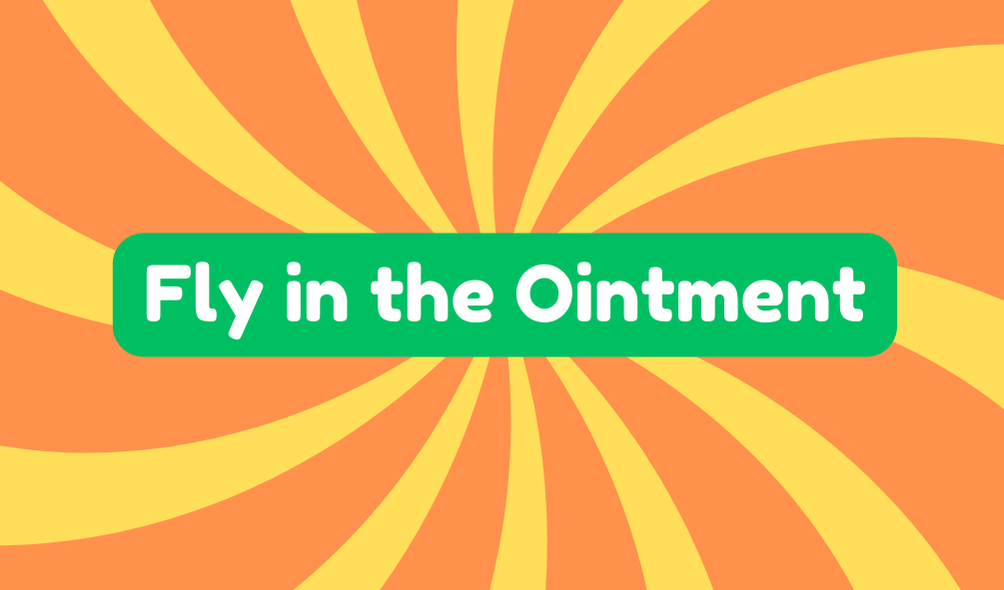The phrase "fly in the ointment" means a small issue that spoils a larger positive situation. It originates from the Bible, specifically Ecclesiastes 10:1, emphasizing that minor flaws can greatly impact our experiences. For example, you might enjoy a beautiful wedding but find the reception hall too small. This expression highlights the importance of recognizing imperfections in our lives, helping maintain a realistic perspective. It continues to resonate today, illustrating how small annoyances can undermine success. If you want to explore more about its synonyms and modern applications, you'll find plenty of interesting connections.
Synonyms
When you encounter a "fly in the ointment," you might also consider synonyms that capture the essence of this phrase. These alternatives highlight that imperfection factor or minor annoyance that disrupts an otherwise positive experience. It's often useful to have a few synonyms in your back pocket.
- Blemish
- Thorn in your side
- Flaw
- Gripe
Each term emphasizes how a small detail can overshadow the bigger picture. Understanding these synonyms can sharpen your communication; instead of merely stating things are going well, you can convey that underlying issues exist. This layered approach not only reflects realism but also brings nuance to your discussions, allowing for a more thorough understanding of your challenges.
Example of Sentences
Although everything seemed perfect, you quickly noticed the fly in the ointment: the event's location was double-booked. It's those minor annoyances that can ruin what should be an outstanding experience. Here are some vivid imagery examples:
- The wedding ceremony was beautiful, but the reception hall was too small for guests.
- Your new gadget's features dazzled you until the battery died unexpectedly.
- The team's project hit all the marks, except the deadline was missed due to miscommunication.
- You enjoyed the meal, but the waiter's attitude left you wanting more.
These scenarios illustrate how small details can tarnish the bigger picture, reminding you that even in the best circumstances, challenges can emerge. Don't let these flies distract you from the overall success you're after!
Origin
Originating from the biblical text Ecclesiastes 10:1, the phrase "fly in the ointment" refers to how a small, dead fly can spoil a whole jar of perfume. This powerful imagery captures the essence of the problem—minor annoyances can ruin positive experiences. In its historical context, it reflects a time when even a tiny blemish was seen as significant. The phrase evolved into a metaphor to address the cultural implications of imperfections in life. It's noteworthy to acknowledge how such a simple concept resonates today. Consequently, this idiom remains relevant, reminding us that sometimes, minor details can derail our best plans. By recognizing these flaws, we're better equipped to navigate the complexities of modern life.
Collocations
Collocations related to "fly in the ointment" often highlight specific contexts where a minor issue disrupts an otherwise positive situation. These phrases not only enhance your language but also bring cultural interpretations into play, offering deeper insights. Here are some common collocations you might consider:
- Minor setback that changes everything
- Small disappointment in an otherwise successful event
- Slight blemish on an otherwise perfect day
- Little annoyance that's hard to ignore
Using these contextual usages can help you articulate concerns more effectively. Always remember that the essence of this idiom is recognizing that even small problems can affect our overall perception and experience. Embracing these nuances can sharpen your critical thinking in everyday discussions, keeping you innovative and relatable.
How to Use in Everyday Language
Incorporating "fly in the ointment" into your everyday language can enhance your communication by succinctly expressing concerns about small issues that diminish a positive experience. Whether you're discussing a project at work or sharing your latest vacation story, using this phrase helps pinpoint the pesky details that can overshadow the good aspects. It tackles communication challenges by allowing you to address imperfections without sounding overly critical. For example, in everyday conversations, instead of saying everything is perfect, you can highlight the key flaw, making your point more relatable. This approach not only fosters clarity but also encourages more honest dialogue, paving the way for productive discussions. So, don't shy away from adding this insightful expression to your vocabulary.
Why Is It Still Relevant Today?
The phrase "fly in the ointment" remains relevant today because it effectively captures the essence of life's imperfections, no matter the context. This metaphor's impact resonates across cultures and highlights humanity's ongoing challenges. As you navigate modern complexities, recognizing these nuances is vital for cultural appreciation.
| Context | Minor Issue | Overall Impact |
|---|---|---|
| Work Projects | Missing feedback | Delayed completion |
| Relationships | Lack of communication | Trust erosion |
| Travel | Flight delays | Stressful experiences |
| Events | Weather changes | Diminished enjoyment |
| Innovation | Cost overruns | Project viability at stake |
Though we seek perfection, acknowledging these "flies" encourages realism. Embracing imperfections enhances our understanding of life's journey and the dynamics of progress.







